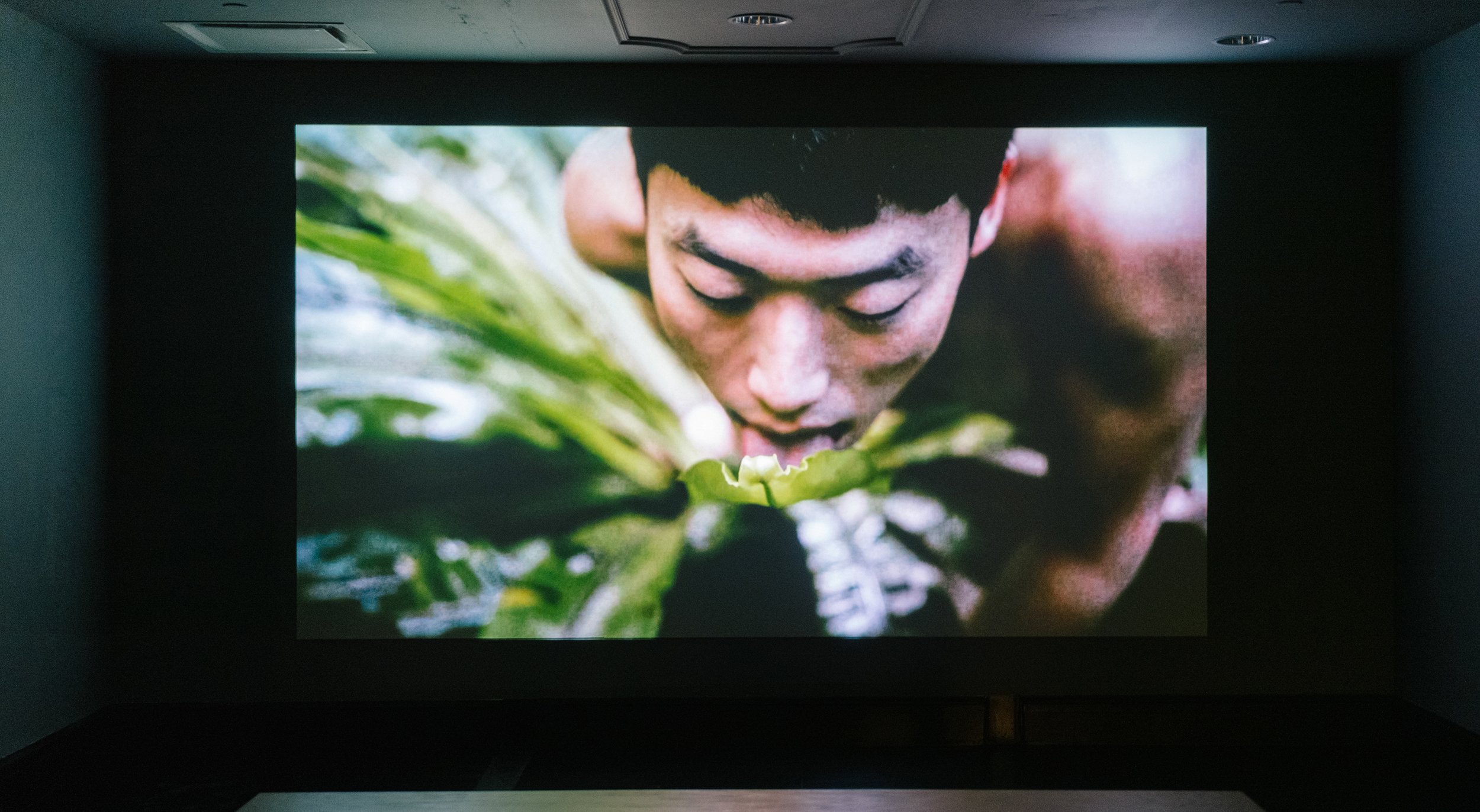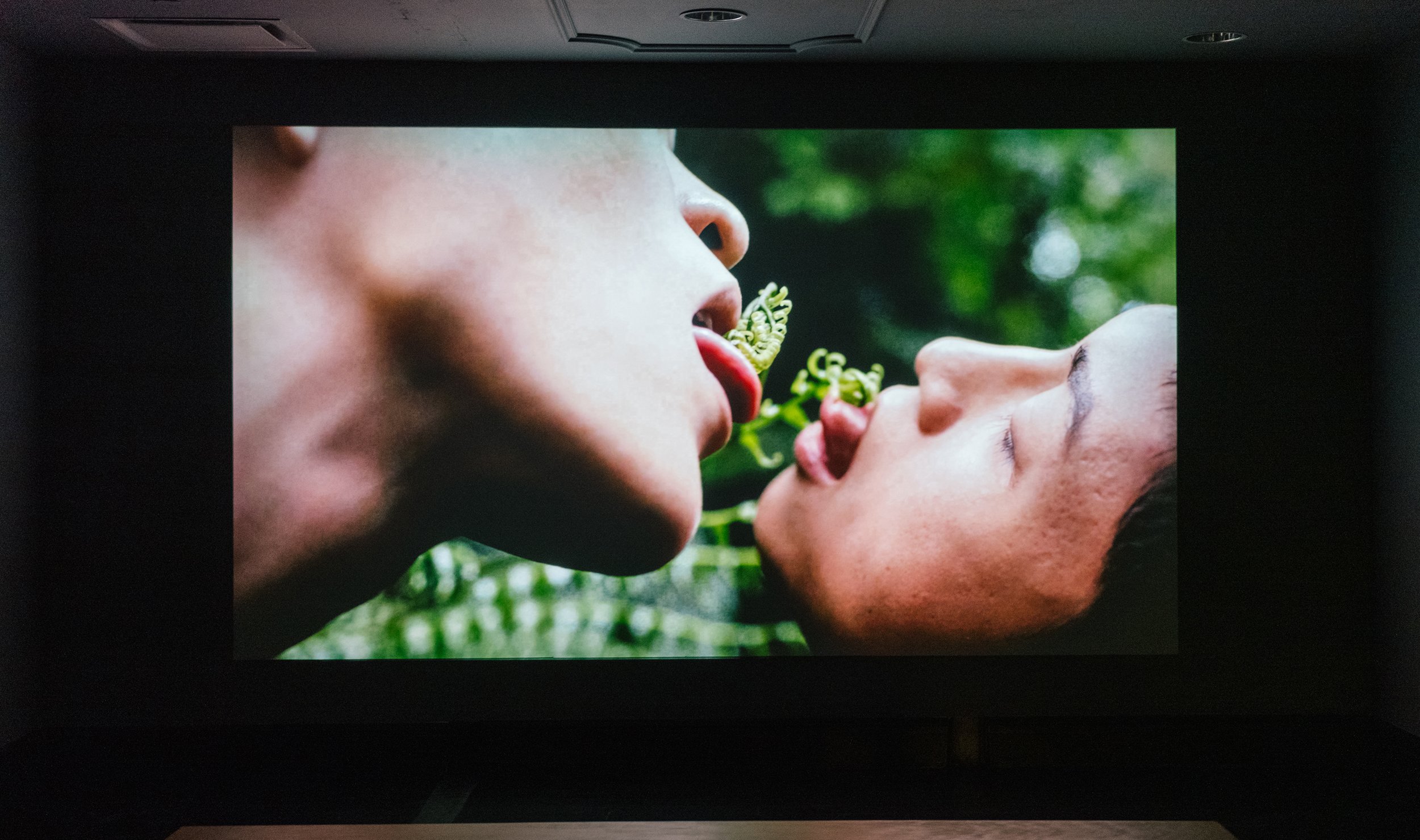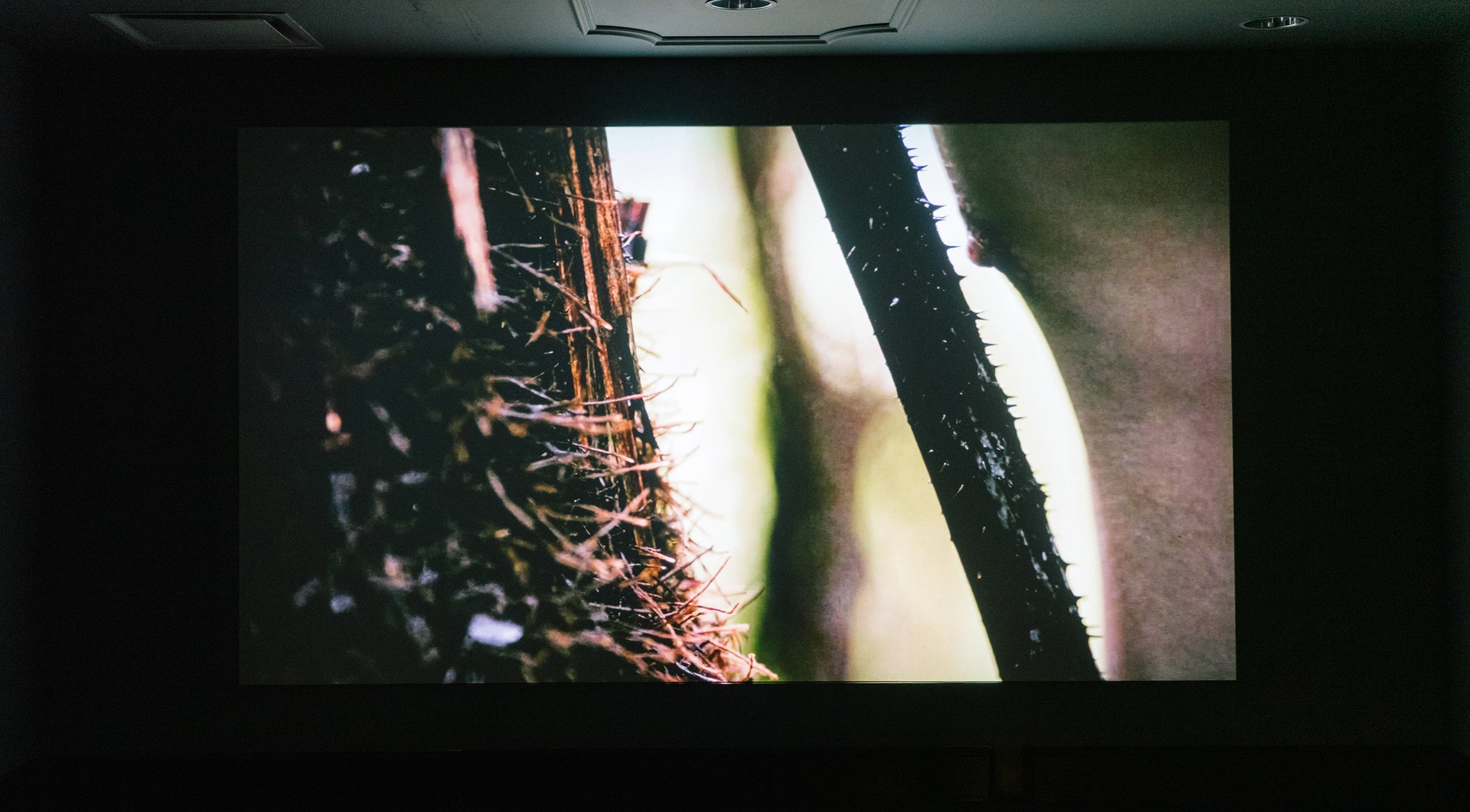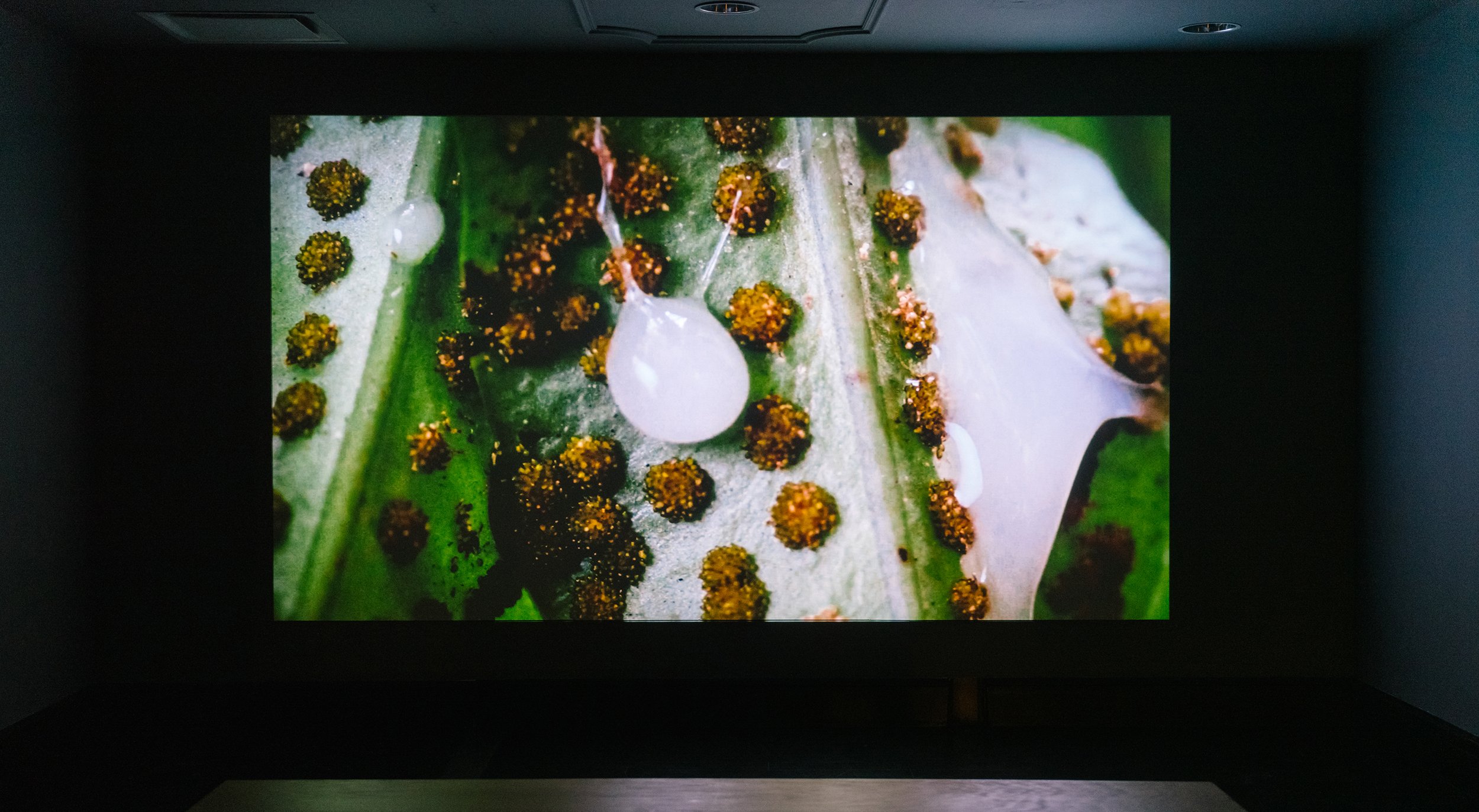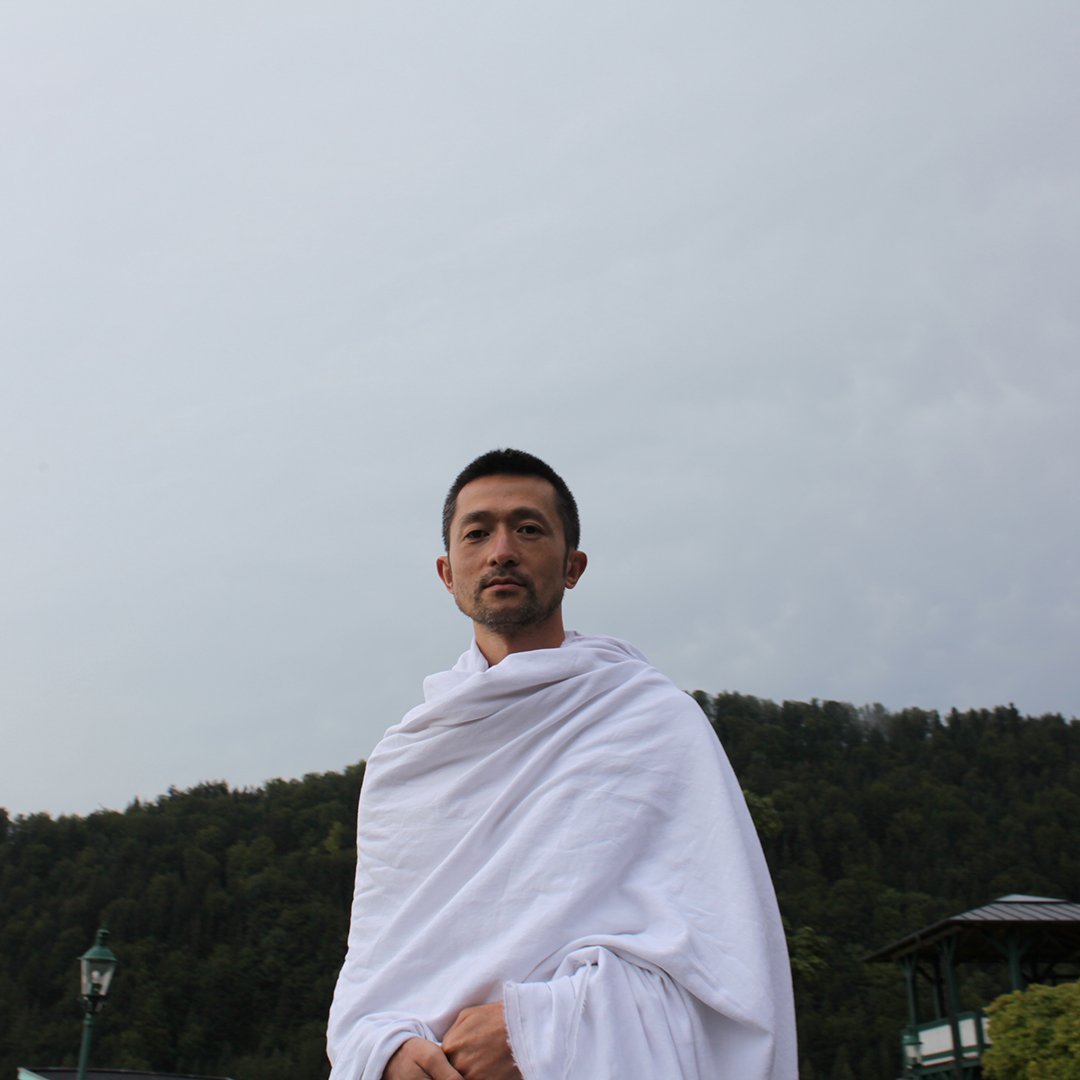hawai‘i triennial 2022
@ ROYAL HAWAIIAN CENTER
Zheng bo
b. 1974, Beijing
lives and works on Lantau Island, Hong Kong
Installation views: Zheng Bo, Pteridophilia I–V, 2016–21, 4k video, color, sound, Royal Hawaiian Center, HT22, Waikīkī. Courtesy of the artist and Hawai‘i Contemporary. Photos: Lila Lee.
Zheng Bo is an artist, writer, and educator collaborating on weedy gardens, living slogans, eco-sexual films, and wanwu (myriad happenings) workshops across a variety of contexts—museum and educational institutions, forest environments, trails, sidewalks, streets, villages, and city centers. Committed to cultivating ecological wisdom, multispecies vibrancy, and an understanding of art beyond human-only creation, Zheng engages pasts and imagines futures from the perspectives of marginalized communities.
In 1993, after a year of military training, Zheng moved to the United States in pursuit of higher education, then to Hong Kong to receive an MFA from the Chinese University of Hong Kong in 2006, before another stint in the U.S. studying with Douglas Crimp and obtaining a PhD from the Graduate Program in Visual & Cultural Studies, University of Rochester, Monroe, New York, in 2012.
In mid-2013 Zheng was called to action by plants, insects, and soil to protect a patch of weeds from being paved over on the former site of the Shanghai Cement Factory—now the West Bund cultural district. This event marked a turning point for Zheng; a timely shift from social to ecological practice. Since then, he has made a point of claiming only part of the credit for every project, with the rest belonging to collaborators in their many forms.
Writing from Hong Kong in May of 2020 amid the COVID-19 pandemic, Zheng comments sensibly, ‘Among the lessons that [this] virus has taught us, tragically, it is that we cannot continue living in the fantasy that we own this planet. We do not. We account for only 0.01 percent of the total biomass on Earth. We have to collaborate with other species, whether we like it or not.’
Keeping with this intimate reality, for HT22 Zheng has contributed five episodes of varying lengths from the ongoing work Pteridophilia (pterido, meaning fern and -philia, love). Pteridophilia draws its inspiration from a visit with a botanist studying ferns in a forest on the edge of Taipei, Taiwan. Each chapter of the ritualized film series, produced semi-regularly since 2016, offers a close-up portrayal of encounters, in some instances sensual and in others explicit, between local plants and humans.
Zheng’s descriptions of each scenario help prime spectators accordingly. As spectators become participants, they reconsider their sexuality and reposition themselves—intimately—in relation to the shared environment/screen:
1. Six young men walk into a forest in Taiwan, making close contact with ferns. They establish emotional and physical relationships with the plants, relying on their bodies rather than words. Ferns are very common in Taiwan. They are valued by Indigenous people but not by Japanese colonists or the Nationalists.
2. A man makes love to a bird’s nest fern (Asplenium nidus) and then starts eating it. [I] reflect on our current moral outlook that it is ‘natural’ to eat plants but ‘unnatural’ to make love to them. Bird's nest fern is a popular delicacy in Taiwan.
3. [I] collaborate with three local BDSM practitioners who in turn collaborate with three fern species—green penny fern (Lemmaphyllum microphyllum), flying spider-monkey tree fern (Cyathea spinulosa), and elephant fern (Angiopteris palmiformis)—to expand BDSM practice.
4. For centuries humans have been in love with furled fronds of young ferns. Inspired by Yaoi anime, this chapter follows a young couple in their acts of love with fiddleheads.
5. This chapter connects spores and sperms.
Participants stroke, kiss, mount, fuck, eat, lick, spank, piss, choke, tie up, caress, finger, and cum. Beyond consent, experienced together, these five invigorating performances raise mixed emotions while making visible and audible the possibilities and limitations of interspecies relationships and connecting, through desire, with the potential of place.
Zheng Bo. Courtesy of the artist and Edouard Malingue Gallery.
Zheng Bo was born in 1974 and grew up in Beijing. At the heart of Zheng’s practice are the notions of relationality and equality. While “critical art” risks diluting its subject matter by interlacing political motivations, Zheng succeeds in revealing cultural nuances where power relations are most profoundly manifested. Rather than a political proposal, Zheng’s new public art exudes above all a pragmatism that reclaims aesthetics from the narrow confines it is often reduced to.
Zheng Bo has worked with a number of museums and art spaces in Asia and Europe, most recently Asia Art Archive (Hong Kong), UCCA Dune Art Museum (Qinhuangdao), Villa Vassilieff (Paris), Ming Contemporary Art Museum (Shanghai), Sifang Art Museum (Nanjing), and Hong Kong Museum of Art. Zheng Bo has had solo exhibitions at the Institute of Contemporary Arts at NYU Shanghai in Shanghai, Kyoto City University of Arts Gallery in Kyoto, Parco Arte Vivente in Torino and TheCube Project Space, Taipei. He taught at China Academy of Art from 2010 to 2013, and currently teaches at the School of Creative Media, City University of Hong Kong, where he leads the Wanwu Practice Group.


